UNIVERSITY STUDIES
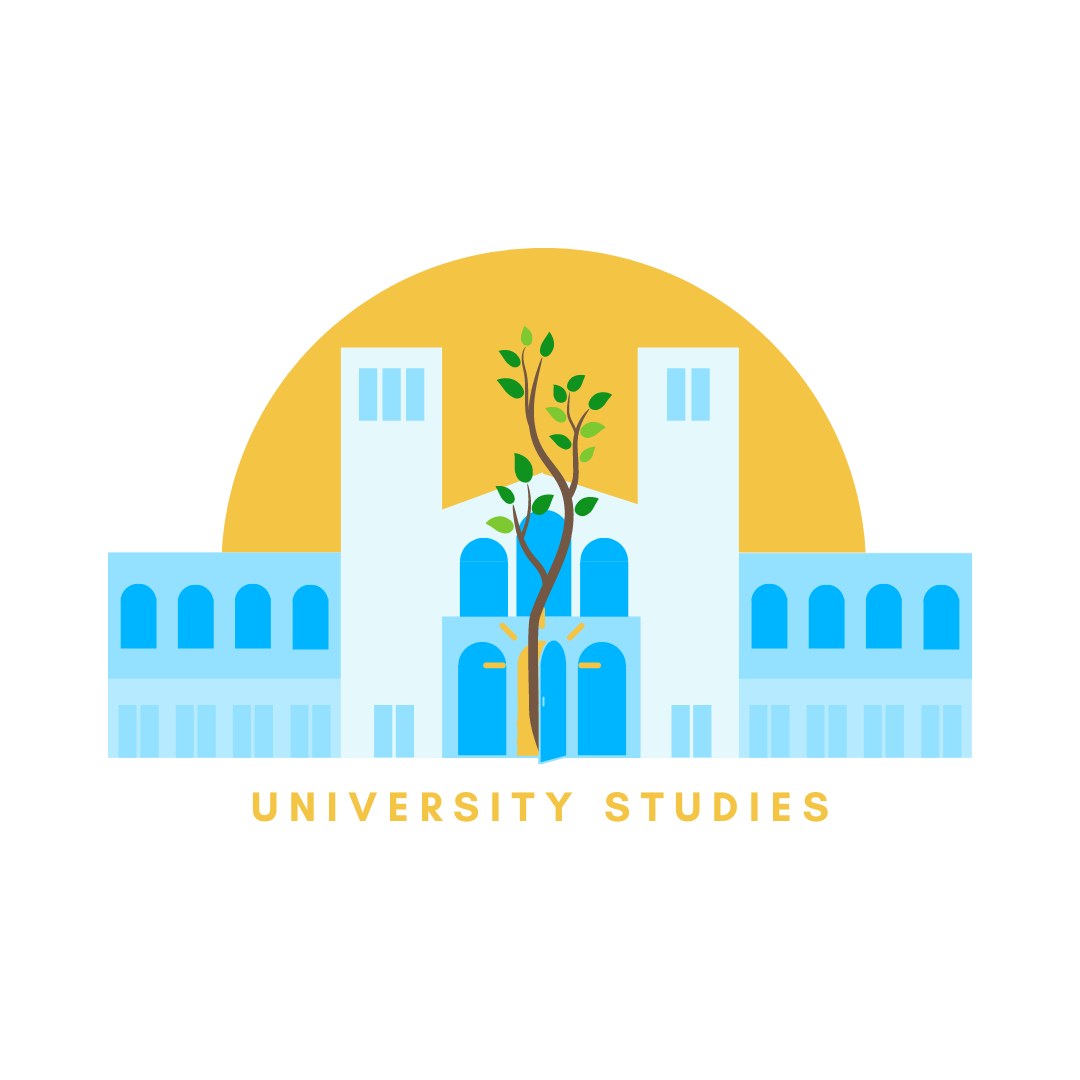
Do you want to ace UCLA? Would you like to experience a smooth transition to UCLA? Do you want to learn how to navigate the complex UCLA system? Do you want to get the most out of your undergraduate experience and still graduate on time? Do you want to feel at home in such a large campus?
If you answered yes to any of these questions then this is the course for you–University Studies 10: ACE UCLA ǀ Critical Strategies to Achieve Undergraduate Excellence, 2 units, Pass/No Pass. Enroll on MyUCLA!
Transition. Engage. Navigate
This course will help you transition into, engage with, and navigate the complex structure of UCLA by teaching you the University’s:
- Mission
- Structure
- Rigors
- Expectations of students
- Pedagogical implications
- High Impact Practices
- Academic success strategies
- Importance of resilience and wellness
- Value of Diversity
- Academic policies
- Campus resources
Students who have taken the course have this to say about it:
- “This class needs to be taken by every student coming in as a first year/transfer. I have learned so much and feel much more confident about navigating this campus. I am not afraid to seek help because I know that there are resources for everything. This class made me feel like a human and not just another student. I loved how that was enforced in every class.”
- “Although I had an intense amount of work this quarter, I can genuinely say that this class was extremely rewarding. Had I not enrolled myself into this course, I would have never gone to other professors’ office hours, let alone be able to gain the confidence I needed to participate in class discussions.”
- “If I hadn’t taken this course I would have still been very lost at UCLA and I probably would have ended up transferring out to a different UC but now that I know more I am going to stay and make the most of my time here.”
- “I think this class is extremely valuable and crucial for first-generation students because it truly informs you of what UCLA expects from its students. I truly wish this class could be a requirement for first-generation students because this class will allow students to learn how to navigate the university which will allow them to feel more confident.”
Please explore the tabs at the left to find out more about these courses.
University Studies was created with the intention of providing students with courses that would help them both transition from their previous institutions (high school, community college, etc.) and give them the tools to engage meaningfully with and maximize their experience at a rigorous research institution like UCLA. Research on undergraduate student sense of belonging and engagement demonstrates that understanding the culture of higher education and establishing connections with faculty, staff, peers, and programs on campus are critical. The courses are taught by University Studies faculty and graduate student teaching assistants who possess knowledge of theories in higher education, positive psychology, effective learning strategies, student development, and belonging. Each course was designed with a specific population in mind so please look through the descriptions under “courses” on the left to see what we have to offer.
A UNIVERSITY STUDIES 10 STORY
Check out Maddy’s story and how University Studies positively impacted her academics.
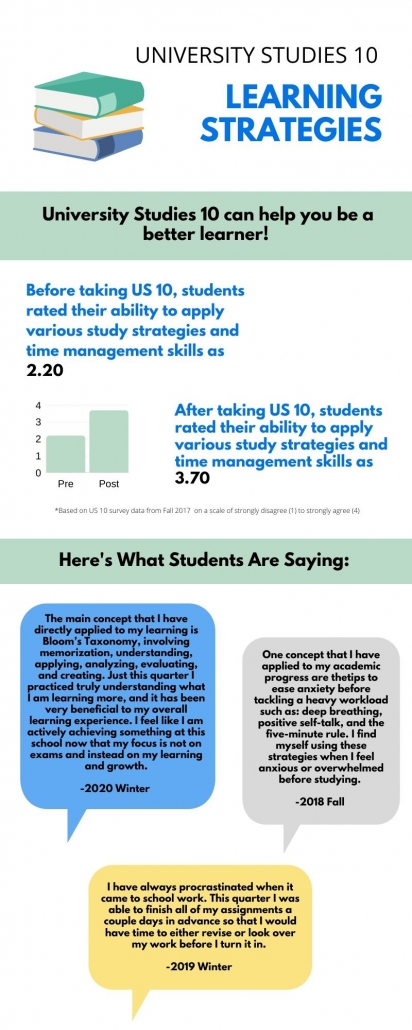
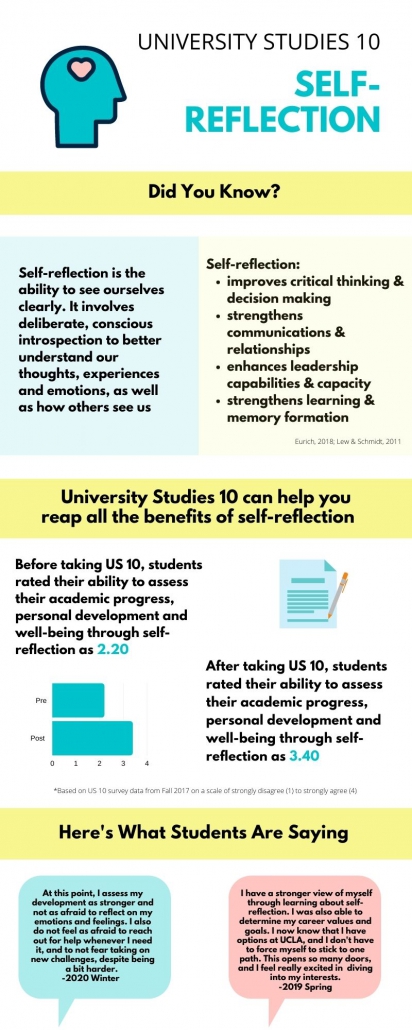
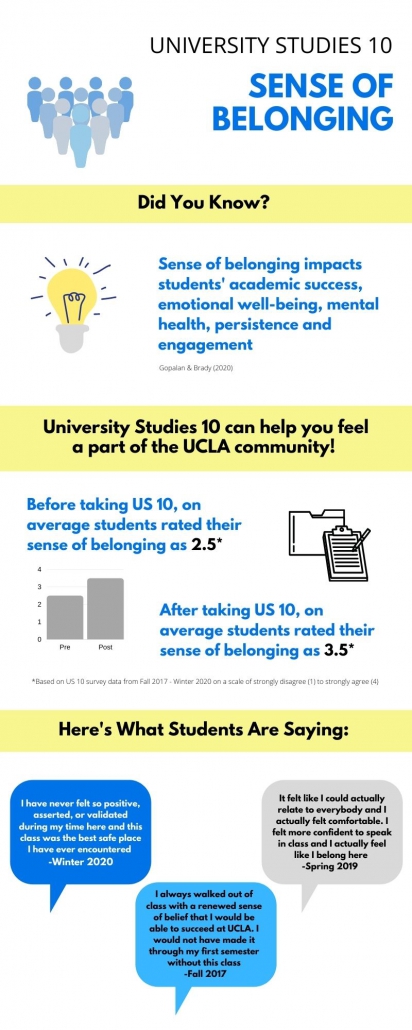
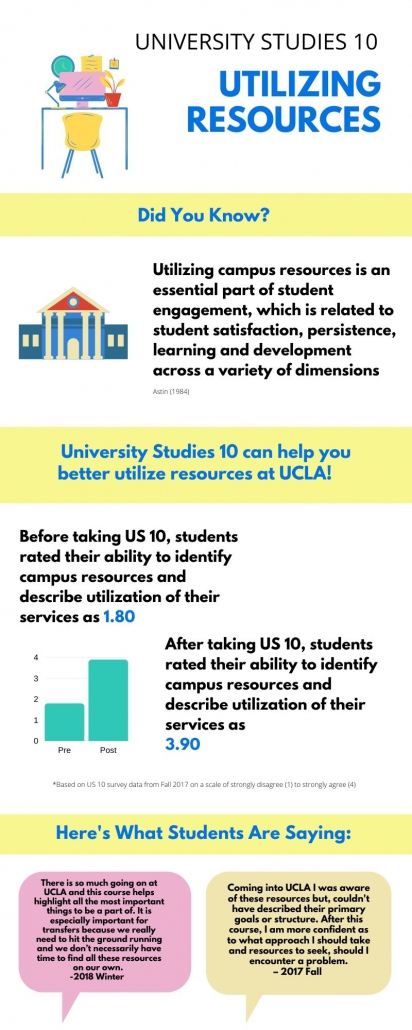
FACULTY ADVISORY COMMITTEE
Muriel C. McClendon , Ph.D., (History) — CHAIR
David MacFadyen , Ph.D. (Comparative Literature)
Frank A. Laski , Ph.D. (Molecular, Cell, and Developmental Biology)
Elizabeth A. Marchant , Ph.D. (Comparative Literature, Gender Studies)
William I. Newman , Ph.D. (Earth, Planetary, and Space Sciences, Mathematics, Physics and Astronomy)
COURSE INSTRUCTORS
Marian H. Gabra, Ph.D. is the Senior Director of Learning & Development and Strategic Partnerships. In her role, she works collaboratively across campus to cultivate spaces of learning and growth for staff and students. She also works intentionally to build strategic collaborations between staff, faculty, and students. Marian and the ACE Committee have been awarded the 2018 NACADA Region 9 Advising Innovation award. As the director of University Studies, she leads an instructional team in curriculum design and innovative pedagogy, and teaches courses under the program, which aim to support students as they transition to, engage with, and navigate UCLA. She is a published author, has been a featured keynote speaker at various programs and conferences, and currently serves on the NACADA Research Committee. Marian also advises students in the Center for Academic Advising in the College. She earned her BA in English from Occidental College in 2002 and her doctorate in Comparative Literature from UCLA in 2010.
is the Senior Director of Learning & Development and Strategic Partnerships. In her role, she works collaboratively across campus to cultivate spaces of learning and growth for staff and students. She also works intentionally to build strategic collaborations between staff, faculty, and students. Marian and the ACE Committee have been awarded the 2018 NACADA Region 9 Advising Innovation award. As the director of University Studies, she leads an instructional team in curriculum design and innovative pedagogy, and teaches courses under the program, which aim to support students as they transition to, engage with, and navigate UCLA. She is a published author, has been a featured keynote speaker at various programs and conferences, and currently serves on the NACADA Research Committee. Marian also advises students in the Center for Academic Advising in the College. She earned her BA in English from Occidental College in 2002 and her doctorate in Comparative Literature from UCLA in 2010.
 Jay Phelan has been on the faculty of the UCLA Life Sciences Core Program since 1997, specializing in evolutionary biology, human behavior, and genetics. He teaches the University Studies 10C seminar for life sciences students. He received a Ph.D. in Biology from Harvard, and master’s and bachelor’s degrees from Yale and UCLA. He is co-author of the international bestseller, “Mean Genes” (Basic Books; translated into nine languages), the author of the textbook “What is Life? A Guide to Biology” (Macmillan; now in its 5th edition), and dozens of technical publications both in biology and science education. Jay has given numerous training presentations for the FBI’s Behavioral Analysis Program and Behavioral Analysis Unit since 2007. He has appeared on ABC’s Nightline, CNN, the BBC, and National Public Radio. His work has also been featured in USA Today, The Los Angeles Times, MSNBC, a TEDx talk, and Elle magazine, as well as in more than a hundred newspapers. He is the recipient of more than a dozen teaching awards, including UCLA’s Distinguished Teaching Award in 2011.
Jay Phelan has been on the faculty of the UCLA Life Sciences Core Program since 1997, specializing in evolutionary biology, human behavior, and genetics. He teaches the University Studies 10C seminar for life sciences students. He received a Ph.D. in Biology from Harvard, and master’s and bachelor’s degrees from Yale and UCLA. He is co-author of the international bestseller, “Mean Genes” (Basic Books; translated into nine languages), the author of the textbook “What is Life? A Guide to Biology” (Macmillan; now in its 5th edition), and dozens of technical publications both in biology and science education. Jay has given numerous training presentations for the FBI’s Behavioral Analysis Program and Behavioral Analysis Unit since 2007. He has appeared on ABC’s Nightline, CNN, the BBC, and National Public Radio. His work has also been featured in USA Today, The Los Angeles Times, MSNBC, a TEDx talk, and Elle magazine, as well as in more than a hundred newspapers. He is the recipient of more than a dozen teaching awards, including UCLA’s Distinguished Teaching Award in 2011.
University Studies 1: Ace the UCLA College-to-Career Transition
Students are introduced to the value of a research institution, its transferable skills, and how they can most effectively maximize time at UCLA to prepare for the college-to-career transition. Offers opportunities for students to reflect upon what they have accomplished both inside and outside of the classroom and how they may market the skills and strengths they have cultivated. Features modules highlighting transferable skills acquired through coursework and co-curricular high impact practices; how to foster meaningful relationships with diverse communities of scholars; the demonstration of awareness of career readiness competencies; how to assess one’s values, skills, interests, and strengths; and how to navigate the college-to-career transition.
University Studies 10A: Ace UCLA ǀ Critical Strategies to Achieve Undergraduate Excellence (First- and Second-Year Students)
University Studies imparts UCLA students with critical strategies to achieve undergraduate excellence at a top-tier research institution. The curriculum teaches the research university’s mission, rigors, and expectations of students, as well as its pedagogical implications. It cultivates a formal space on campus where UCLA students learn the following: to engage collaboratively with their diverse community of scholars; to comprehend and apply effective learning strategies and theoretical foundations of college student development; to navigate the complex structure of the University; to practice resilience and growth mindset; to think critically about diversity and their identity; and to be fully aware of their value to the intellectual fabric of the institution as contributors to innovative research and scholarship.
University Studies 10C: ACE UCLA ǀ Critical Strategies to Achieve Undergraduate Excellence (STEM Students)
University Studies imparts UCLA students interested in or pursuing majors in the life sciences with critical strategies to achieve undergraduate excellence at a top-tier research institution. The curriculum teaches the research university’s mission, rigors, and expectations of students, as well as its pedagogical implications. It cultivates a formal space on campus where UCLA students learn the following: to engage collaboratively with their diverse community of scholars; to comprehend and apply effective learning strategies and theoretical foundations of college student development; to navigate the complex structure of the University; to practice resilience and growth mindset; to think critically about diversity and their identity; and to be fully aware of their value to the intellectual fabric of the institution as contributors to innovative research and scholarship.
University Studies 10D: Ace UCLA ǀ Critical Strategies to Achieve Undergraduate Excellence (Transfers)
University Studies imparts UCLA students with critical strategies to achieve undergraduate excellence at a top-tier research institution. Designed specifically for transfer students, the curriculum teaches the research university’s mission, rigors, and expectations of students, as well as its pedagogical implications. It cultivates a formal space on campus where UCLA students learn the following: to engage collaboratively with their diverse community of scholars; to comprehend and apply effective learning strategies and theoretical foundations of college student development; to navigate the complex structure of the University; to practice resilience and a growth mindset; to think critically about diversity and their identity; and to be fully aware of their value to the intellectual fabric of the institution as contributors to innovative research and scholarship.
University Studies 10E Ace UCLA ǀ Critical Strategies to Achieve Undergraduate Excellence (First-gen Students)
University Studies imparts UCLA students with critical strategies to achieve undergraduate excellence at a top-tier research institution. Designed specifically for first-generation* college students, the curriculum teaches the research university’s mission, rigors, and expectations of students, as well as its pedagogical implications. It cultivates a formal space on campus where UCLA students learn the following: to engage collaboratively with their diverse community of scholars; to comprehend and apply effective learning strategies and theoretical foundations of college student development; to navigate the complex structure of the University; to practice resilience and a growth mindset; to think critically about diversity and their identity; and to be fully aware of their value to the intellectual fabric of the institution as contributors to innovative research and scholarship.
*Students whose parents or caregivers have not completed a four-year degree in the U.S.
University Studies 10F: Ace UCLA ǀ Critical Strategies to Achieve Undergraduate Excellence (Humanities)
University Studies imparts UCLA students interested in or pursuing the Humanities with critical strategies to achieve undergraduate excellence at a top-tier research institution. The curriculum teaches the research university’s mission, rigors, and expectations of students, as well as its pedagogical implications. It cultivates a formal space on campus where UCLA students learn the following: to engage collaboratively with their diverse community of scholars; to comprehend and apply effective learning strategies and theoretical foundations of college student development; to navigate the complex structure of the University; to practice resilience and growth mindset; to think critically about diversity and their identity; and to be fully aware of their value to the intellectual fabric of the institution as contributors to innovative research and scholarship.
University Studies 15A: Collaborative Learning Workshops for Humanities and Social Sciences Majors
Designed for students in First Year Scholars Program (FYSP). Part I of three-part series of collaborative learning and community-building work sessions. Collaborative work spaces and participatory learning environments are integral component of student development. Creates specific and unique space for FYSP scholars to cultivate community and support, as well as develop critical strategies to achieve undergraduate excellence at top-tier institution. Engages students collaboratively with diverse community of scholars; supports their understanding and application of effective learning strategies; guides students in practice growth mindset, navigation of complex structure of UCLA, thinking critically about diversity and their identity, and being fully aware of their value to intellectual fabric of institution as contributors to innovative research scholarship.
University Studies 15B: Collaborative Learning Workshops for Humanities and Social Sciences Majors
Designed for students in First Year Scholars Program. Workshops are integral component of student learning and development. Continues to cultivate learning communities. Workshops prepare students for second year, as they become more intentionally engaged in academic community, at UCLA and beyond. Workshops foster academic, professional, and personal development of students majoring in humanities and social sciences. Instructors, peer mentors, and campus partners facilitate interactive workshops that help students transition to, engage with, and navigate UCLA as they culminate their first year at university.
University Studies 15C: Collaborative Learning Workshops for Humanities and Social Sciences Majors
Designed for students in First Year Scholars Program (FYSP). Part III of three-part series of collaborative learning and community-building work sessions. Students work together on ongoing research proposal and project presented at culmination of program. Collaborative work spaces and participatory learning environments are integral component of student development. Creates specific and unique space for FYSP scholars to cultivate community and support, as well as develop critical strategies to achieve undergraduate excellence at top-tier institution. Engages students collaboratively with diverse community of scholars; supports their understanding and application of effective learning strategies; guides students in practice growth mindset, navigation of complex structure of UCLA, thinking critically about diversity and their identity, and being fully aware of their value to intellectual fabric of institution as contributors to innovative research scholarship.
University Studies 30: Retention Issues in Higher Education
The purpose of this course is to assist students in academic difficulty or who are working on readmission back into UCLA. With the understanding that the factors which contribute to college student departure are varied and complex, the goal of this course is to provide students who are working towards readmission with a framework with which to understand these factors. Drawn from the leading theories on college student retention and departure, the course is divided into two pillars: I. academic integration; and II. social integration for academic success. Through each pillar, we will focus on the practice of individual and collective strategies that contribute to academic success.
Students may only take one US 10 seminar (A-F) for credit.
For inquiries regarding University Studies, please contact:


 Center for Academic Advising in the College
Center for Academic Advising in the College